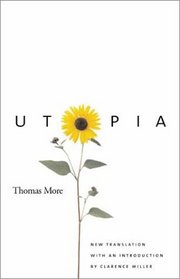Helpful Score: 2
This is a modern publication of the unabridged classic written in 1516. It very interesting but you must be prepared to read it for itself and not as a modern book.
Helpful Score: 1
This edition of Thomas More's Utopia is expertly translated by Adams from the Latin and easy to read. Adams' footnotes are informative and often times a hilarious edition to More's work.
Taking a more modern approach to More, Adam's footnotes suggest that perhaps More does not take his perfect society literally, and expects the reader to read between the lines and see that such a society is obviously not possible. This is a theory of More's thought processes that I agree with, so I found this translation and Adam's thoughts quite welcome and agreeable.
However, there are many schools of thought on the issue as to whether More was completely serious about the suggested society in Utopia, although a knowledge of More as a person would suggest that he employed a subtle sarcasm throughout his life, and therefore it is not a stretch to suggest that Utopia was laced with this same humor and etched with ironic impossibilities that More hoped an educated person would be able to see.
Additionally, the fact that More places himself as a character in the book, and narrates through the use of a man whose name literally translated means "nonsense-peddler" leaves little doubt in my mind that to take More's Utopia at face-value is to do a disservice to More, the intellectual scholar that he was, and Utopia itself.
Taking a more modern approach to More, Adam's footnotes suggest that perhaps More does not take his perfect society literally, and expects the reader to read between the lines and see that such a society is obviously not possible. This is a theory of More's thought processes that I agree with, so I found this translation and Adam's thoughts quite welcome and agreeable.
However, there are many schools of thought on the issue as to whether More was completely serious about the suggested society in Utopia, although a knowledge of More as a person would suggest that he employed a subtle sarcasm throughout his life, and therefore it is not a stretch to suggest that Utopia was laced with this same humor and etched with ironic impossibilities that More hoped an educated person would be able to see.
Additionally, the fact that More places himself as a character in the book, and narrates through the use of a man whose name literally translated means "nonsense-peddler" leaves little doubt in my mind that to take More's Utopia at face-value is to do a disservice to More, the intellectual scholar that he was, and Utopia itself.
Helpful Score: 1
One of the most influential books in the Western tradition, Thomas More's Utopia (1516) describes an imaginary island community enjoying perfect social and political harmony. This volume is the first to offer the original English translation of the work in an edition that allows students to explore in depth Utopia's historical and intellectual contexts as well as the circumstances of its reception. Based on Ralph Robynson's revised and corrected 1556 translation, with modernized spelling and extensive annotations, this edition returns students to the voice of the past, allowing them to experience the text as it was first encountered by early modern English readers.
(amazon.com)
(amazon.com)
Helpful Score: 1
Sir Thomas More's entertaining description of Utopia, an island supporting a perfectly organized and happy people, was a best-seller when it first appeared in Latin in 1516. This work of a catholic martyr has later been seen as the source of Anabaptism, Mormonism, and even Communism.
Utopia revolutionized Plato's classical blueprint of the perfect republic, mainly by its realism. Locating his island in the (then) New World, More endowed it with a language and poetry, and detailed the length of the working day and even the divorce laws. Such precision gives a disturbing and exciting impact to Utopia, which still remains a book of the future.
Utopia revolutionized Plato's classical blueprint of the perfect republic, mainly by its realism. Locating his island in the (then) New World, More endowed it with a language and poetry, and detailed the length of the working day and even the divorce laws. Such precision gives a disturbing and exciting impact to Utopia, which still remains a book of the future.




